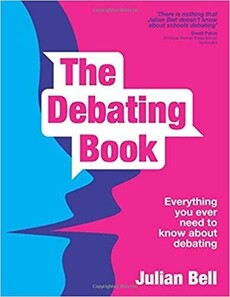
posted 24th September 2023

'It's a bit like ...'
We all use this phrase, or something like it, when we are trying to explain something to someone. If they can't understand what we're saying, we might take something which is similar but easier to understand, explain how that works, and then show how it relates to what we're trying to explain. This is called analogy.
How can debaters use analogy? It's important to realise that analogy doesn't actually prove anything. But what it does do is illustrate your argument. As such, it can be a very powerful tool. It can turn an abstract argument into something concrete, and therefore easier to understand. It creates a little story - and stories are almost always more memorable and persuasive than abstract arguments.
Let's take an example. You're speaking for the proposition on the motion This house would make it compulsory for at least 50% of company directors to be female. (Company directors are the leaders of a business. They are elected by shareholders, who are people who have invested money in the company; the more money they have invested, the more votes they have. Currently - September 2023 - across the FTSE 100, a group of the top 100 companies in the UK, only 16.4% of directors are female.)
You've made the case that women making a career in business start out at a disadvantage, held back by institutional sexism in business and society, internalised sexism (being made to believe that they're not good enough) and practical obstacles (insufficient support for maternity leave / childcare etc.). These disadvantages need to be removed by legal intervention in the election of directors to company boards to ensure equality. All very clear and rational, but a bit abstract. Time for an analogy.
'Imagine a one mile race between two runners,' you say. 'One runner is allowed to start thirty seconds before the other one. Not surprisingly, he wins, even though his competitor is fast enough to gain twenty seconds on him during the race. That's how it is in business. Women have to start the race later, because of all the disadvantages I have just explained. That's why men dominate business; not because they're better at it. Now imagine the race judge stops the first runner halfway round, and makes him pause for thirty seconds. The second runner has time to catch up. We can now be sure that the race will be won by the faster, better runner. That's what our proposed measure is doing; stopping the clock to allow women to catch up on men's unfair start. It's simply making the race to the top in business a fair contest.'
Listeners can picture that race in their mind, and can see the unfairness of the current system, and so are more likely to be persuaded.
How should you respond to the use of analogy by the other side? Two ways:
1. Show the analogy doesn't work
'Electing company directors is not like a race with one runner given an unfair advantage. Business is highly competitive, and it is in the financial interests of shareholders to elect the best possible people to the company board to ensure that the company succeeds. Talented women will not be allowed to lag behind in the way you have described; they will be spotted by shareholders, and appointed. No shareholder who wants their company to prosper would allow one half of applicants to be given an unfair and irrational advantage.'
2. Produce a counter-analogy
'Electing company directors is like a race. But it's like a trial race run by the coach of a team who wants to identify the best runners in his squad, so he can pick a winning team for a big competition. To do that, he will want accurate results; he would never allow one runner an unfair advantage, as that would make it less likely that he will pick a winning team. The shareholders are the coach; their investment depends on picking the best directors; they won't allow any unfairness in the trial race.'
Be careful not to get too obsessed with the details of the analogy, e.g. getting sidetracked into discussing whether or not spiked shoes and / or protein shakes can help one runner over another. Keep focused on the principles behind the argument, i.e. whether quotas are fair and / or effective. And remember that analogies don't prove anything. But they do help to explain, and persuade.



